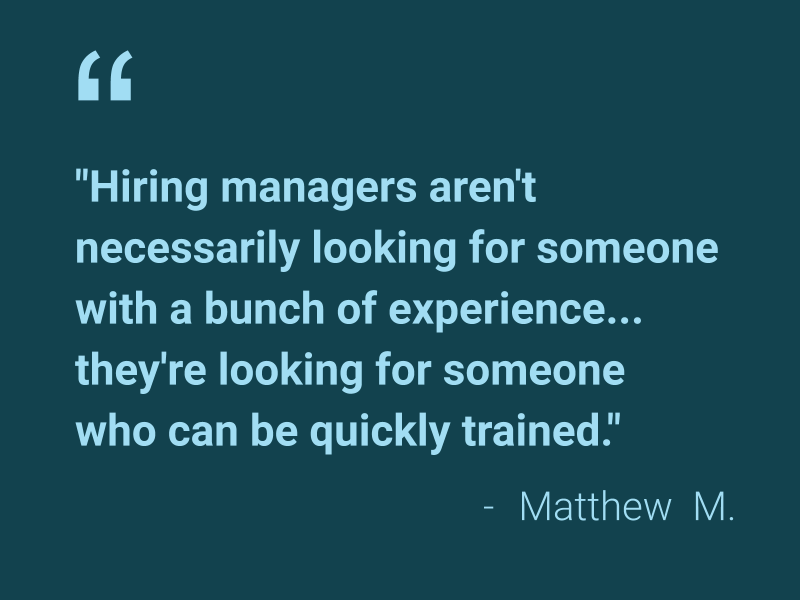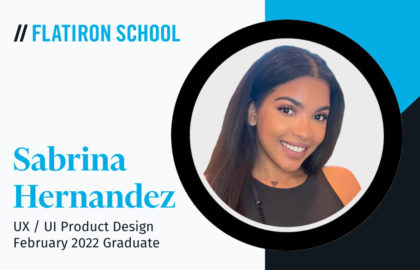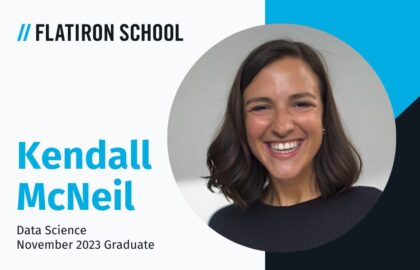
Meet Flatiron Grad and Idelic Software Engineer, Matthew McCormack! He learned coding to add a side hustle to teaching and gigs. But in the end, the symphony of coding was simply music to his ears. Matthew shares his story, here:
What did you do prior to Flatiron?
Prior to my time at Flatiron, I was (and still am) a freelance trumpet player and private trumpet teacher. I played trumpet in various groups and genres, like orchestras, funk bands, and other small ensembles while teaching around 25-30 private trumpet students. While I had many problems with making my living this way, the biggest was stability, which led to problems with job satisfaction. My schedule and income were both unstable due to an irregular performance schedule, which would often conflict with my teaching schedule. Because of the irregularity, I was under constant pressure to accept every gig that I was offered and every student that wanted private lessons. This caused me to take many gigs that were musically unsatisfying, and teach many students that didn't really want to learn.
I read that you originally explored coding to focus on building websites for musicians. What did you discover about coding that led you to fully pivot into it as a career?
What initially inspired me to consider pivoting into coding as a career was the ability to create things that truly help people in surprising ways. As a performer, I felt that whatever I did, no matter how much work I put in, it didn't always make a positive, or even lasting impact on an audience I played for. With coding, I felt like I could actually build something that could actually make someone's life easier and more enjoyable. Maybe not everyone can feel inspired by a live orchestra, but everyone can appreciate an app that makes a task they do every day more efficient. What turned my focus to programming was the idea of learning how to build websites for musicians. My idea was to add another freelance business to take the stress off the other two. The more I learned about building a career in programming in general, the more I realized the possibilities programming could bring.
What was your approach to networking?
My networking post-FIS included attending Meetups, leveraging my first degree connections, as well as reaching out to Flatiron alums who worked for companies that were hiring in the Pittsburgh area. I received the most meaningful connections from fellow Flatiron alums, many of which offered advice for interviews/applications for their company. A few even offered to put in a good word for me! My most promising leads came from my existing connections from before FIS. It turned out that my network of people in the tech industry was much larger than I thought! Many freelance musicians I knew had day jobs for companies that were hiring software engineers. The connection that resulted in my first interview came from a friend that I had for as long as I've lived in Pittsburgh.

What challenges did you face along the way?
While I experienced the normal course work challenges, the challenges I struggled with the most happened late into FIS journey. When I started my job search, my strategy could best be summed up as "be the person you want to work with," something I borrowed from my experience as a musician. After I went to my first Meetup, I realized that I needed to think about my strategy more. I found that people were remembering me more as the "trumpet guy" then a programmer. What was needed was a redefinition of how I introduce myself to people, leading only with the software developer until the trumpet experience came up naturally. After defining myself as a trumpet player for 10 years, this was extremely uncomfortable for me. After a lot of internal struggle, I came up with an elevator pitch/introduction strategy that focused on programming, but still referenced my previous experience in a way that still told people that I am a programmer now.
How did you ultimately receive your job?
I received my job offer from the first company I interviewed with. My friend from college, who works for the company, encouraged me to apply, even though I wasn't very familiar with the programming languages they were asking for. It was at my 3rd interview that the interviewer asked me about not knowing the two languages that were required on the job (Python and Go). I showed him that I had done my research by explaining that Ruby had many similarities to Python and that I would be eager and willing to learn anything that was required of me. After my final interview, I honestly didn't know if I did really well, or really poorly. After I had received my offer, my teammates told me that I was the clear person for the job, not just from how I approached the problem, but how I collaborated with the team.
What duties do you perform at your work? What keeps you busy?
My position with Idelic deals mostly with data integration. I migrate data from our customers (trucking companies) to our platform, so that their data can be easily managed in one place, and be used with our machine-learning models to predict problem drivers and problematic driving habits. Basically, I'm building tools so that if we have a customer that uses Website A for their HR data, we can say "Oh, we have an integration with Website A" and be able to automatically retrieve all of the customer's data and format it into our system.
My advice for fellow Flatiron alumni who are out there on the job search?
Define yourself as the job you want – This may seem obvious, but it was the hardest lesson I had to learn. I kept introducing myself as a "musician who's studying software" for a long time, so people thought of me only as a musician. Only after I actually started calling myself a "software engineer" did I actually believe it myself, and therefore, made others believe it as well. It may seem like a re-worked "fake it till you make it" but it really is the most crucial part of redefining yourself in order to make a career pivot. Continue learning after your coursework is over – Flatiron teaches you a heck of a lot but A: it doesn't teach you everything there is to know and B: not all of it sticks. Keep that curiosity that brought you to Flatiron in the first place and continue teaching yourself anything else you think you might need. Combat inexperience with eagerness to learn – any interviewer can take one look at your resume and see your inexperience (depending on your career before Flatiron), but what you can do is show that person that you're willing to learn anything that would be needed for the job. Hiring managers aren't necessarily looking for someone with a bunch of experience and knowledge, they're looking for someone who they like to work with, and someone who can be quickly trained. Especially for Junior roles, they want to hire good humans, not just good coders.
Career coach Maria Paniccioli on how Matthew's job search was a great success:
"Matthew did amazing work with successfully navigating a career transition from music into software engineering by leveraging the transferable skills between these industries, his process of working through imposter syndrome as an emerging software engineer, and most importantly being a very active networker. He fully trusted and embraced the coaching experience by pursuing and creating connections with his network."




